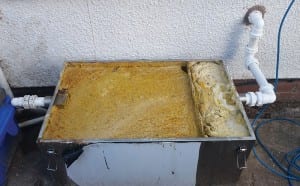A frontline organisation for contractors battling with fats, oil and grease (FOG) in commercial and industrial kitchens has been set up in association with British Water.
THE Grease Contractors Association (GCA) was formed in February and will bring together specifiers, installers and maintainers of grease management systems.
Fats, oil and grease in sewerage networks and treatment works can cause blockages that lead to costly interventions and disruption to both to customers and the general public. It is hoped the new body, which is made up of those directly involved in grease management, will help improve industry standards and build better understanding of the factors at play in FOG build-up.
Industry expertise
Mike Goodbourn, owner of GMG Grease Management and founder and chairman of the new Association said: “In many ways there are no greater experts than people who are dealing with this problem on a daily basis – so the Grease Contractors Association could significantly add to our knowledge of how to deal with and prevent problems caused by fats, oil and grease.

“FOG is a growing problem and yet there has been very little comprehensive scientific research done into the different methods of dealing with the issue. It can be hard for the owners of commercial and industrial kitchens to know which is the best way to deal with the issue.”
Martin Fairley, a founder member of the British Water FOG Forum and an advisor to the new association said population growth, the popularity of take-away and restaurant food, climate instability and a lack of public understanding of fat disposal had all contributed to a “perfect storm” making FOG an increasingly tricky issue, both for commercial caterers and for the water industry.
Code of practice
The Grease Contractors Association, which currently has eight members, is open to businesses working directly in grease management, whether in installation, maintenance or manufacture. There will be different levels of membership, depending on the scope of the business.
The Association’s first objective is to draw up a code of practice for members, which will cover service requirements, waste management, site evaluation, and health, safety and hygiene in food establishments.
By bringing together a group of frontline experts it is also hoped to add to the scientific understanding of the challenges posed by fats, oils and grease. The aim is to create a practical forum, which is ‘technology neutral’ – not favouring one brand or method of grease management over another, but looking for the most effective practices for all.
In the longer term the Grease Contractors Association will act as the voice of the industry, dealing directly with both UK and European government bodies, advising regulators and working to increase public awareness.
The group will work closely with representatives of the food, restaurant and catering industries. Eventually it is hoped membership of the GCA will also represent a mark of quality within the industry, indicating a commitment to research and best practice.
Important voice
Marta Perez, Technical Manager of British Water said: “We are very pleased to announce the creation of the Grease Contractors Association, which will bring together experts working in this field.
“This new body, which has been formed under the auspices of British Water, will provide an important voice for those working in the industry as well as providing a chance to share expertise and to develop best practice.”
British Water Chief Executive Ashley Roe said: “The formation of the GCA will bring clarity and transparency to a vitally important industry which is currently managed in a piecemeal and unstructured fashion.
Grease contractors are an under-represented group, whose knowledge and expertise is not always heard, so British Water is delighted to help create an industry body which can help shape good practice and which could be consulted on any future regulation.”







